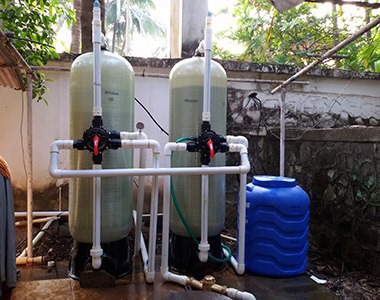
A Softener Plant is a water treatment system designed to remove hardness-causing minerals—primarily calcium (Ca²⁺) and magnesium (Mg²⁺)—from water. These minerals are responsible for scaling in pipelines, boilers, water heaters, and industrial equipment. Hard water also reduces the effectiveness of soaps and detergents, leaving residue on dishes, fabrics, and skin. A softener plant is thus essential in residential, commercial, and industrial settings to enhance water quality and prevent costly damage to infrastructure.
The core process in a softener plant is called ion exchange. In this system, hard water passes through a pressure vessel filled with cation exchange resin—tiny beads that are negatively charged and saturated with sodium (Na⁺) or potassium (K⁺) ions. As the water flows through the resin bed, calcium and magnesium ions in the water are attracted to the resin and replaced with sodium or potassium ions. This exchange effectively removes the hardness, resulting in soft water at the outlet.
Once the resin becomes saturated with calcium and magnesium, it must be regenerated. This is done using a brine solution (saltwater), which flushes the resin and restores the sodium or potassium ions. The regeneration cycle typically includes backwashing (to remove suspended particles), brine draw, slow rinse, and fast rinse stages. Most softener plants have automatic or semi-automatic control valves that manage this regeneration process based on time or volume of water treated.
Softener plants come in a variety of sizes, from small domestic units to large-scale industrial systems capable of handling thousands of liters per hour. Industrial plants may include duplex or triplex systems for continuous operation, multiple resin columns, and integrated flow meters, hardness sensors, or programmable logic controllers (PLCs) for precise control. The design and capacity of a softener plant depend on the level of hardness in the source water and the volume of water required.
In summary, a water softener plant plays a vital role in improving water usability and protecting infrastructure. By effectively removing calcium and magnesium through ion exchange, it ensures longer equipment life, better cleaning efficiency, and reduced operational costs. Soft water is especially important in industries like textiles, pharmaceuticals, hospitality, and food processing, where water quality is directly linked to product quality and equipment performance.
